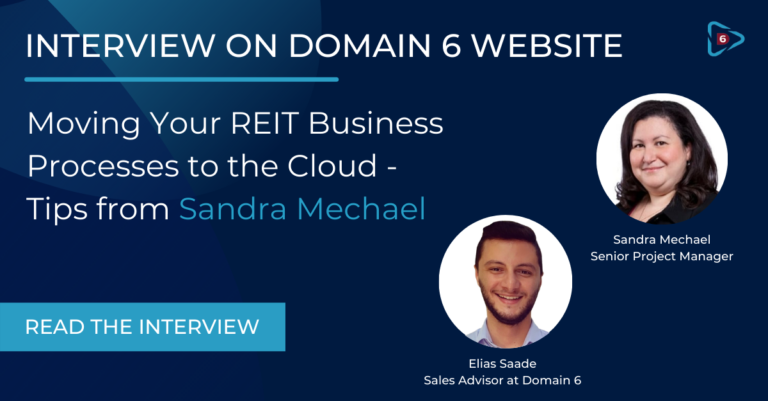
Interview: Moving Your REIT Business Processes to the Cloud – Tips from Sandra Mechael
- February 21, 2022


Sales Advisor
Elias Saade
Hi Sandy! Thank you for agreeing to sit down with me for a quick interview to discuss digital transformation trends happening in the REIT industry.
Sandy Mechael
Sure, always excited to talk tech and real estate
ES: Let’s start with WHY. What was the reason for you as a CIO of a REIT to move your business processes to the Cloud?
SM: In general, a lot of it depends on the particular company, the size of the business and where they are in their IT evolutionary lifecycle. When it was my turn and my decision to make, we were moving from a combination of an on-premise server room and a data center cage to the Cloud, and it just made sense rather than continue to invest in a hardware technology to go ahead and make the leap to the Cloud.
ES: Makes total sense. Why in this case are some REITs still hesitant about moving to the Cloud?
SM: There are a few factors. Firstly, there is technology security factor. Then, there is a financial factor, and then there is a staff and skill set factor. Let’s start with security. Do you know how many people still believe that keeping their data in the Cloud is not safe and that if they protect it behind their own firewall on their own servers, that it’s more protected?
ES: Yeah, it is quite misleading in reality.
SM: Exactly. We all know that’s false because just like any cloud service provider, data centers can be hacked, anything with an outside connection can be hacked, and even things with an inside connection can be hacked if somebody can gain access to the location. And so, we understand it is a false sense of security and a desire to control access to the data. In some cases REITs believe that their data is unique to them and that if anybody were to see it, that all of a sudden they would understand what their secret sauce as a company is. But we all know that’s not true in real estate. In this industry it’s all about the actual physical asset and the location that asset is in. So, it’s taking time, but real estate companies are starting to realize that now.
The finance perspective is the one that’s very nuanced. When you move your systems to the Cloud and you move to a subscription based service, that becomes an IT expense on your books instead a capital expense which can be depreciated over multiple years. That’s a hardware expense, which you can then capitalize and depreciate over 10 years. So, if you are the kind of organization that is sensitive about your expenses and you want to show higher capital expense with depreciation over multiple years versus just flat expenses every year because you’re paying for a subscription based service, it can be very material and it can make your company look like its’ expenses are overinflated. Now, from an IT perspective, if you have somebody that can explain that to investors, to senior management, to the board – you can get over that. But you have to be able to explain it right. You have to have somebody in IT who can sit down with the budget and explain why expenses are high in a particular area, but then show that expenses are lower in another area.
ES: Yes, make sense. And what about the third piece? The talent?
SM: Yes, right. Everybody gets very comfortable with the staff and the talent that they have, who are used to doing things a very certain way. Some have reskilled themselves so they can move systems to the Cloud. Some are very stubborn and set in their ways and don’t. Companies are afraid to lose people who have been around for a long time because they have a lot of history and institutional knowledge. So they feel that going with technology resources who know more about the Cloud than on-premise, will change that. I mean we all have to just get over that. So those are the three big reasons why a number, and it’s not specific to real estate, of companies haven’t moved to the Cloud.
ES: Thank you, Sandy. Well, you were one of those leaders who were able to step up and just get over some of these reasons. I am curious what were the issues or challenges that you have faced during the ERP implementation phase?
SM: So, the big challenge with moving any ERP system from a whatever has been in-house for years and years and years is a change, right? It is starting over and figuring out how much data you want to migrate, figuring out whether you want to maintain your structure the way it is or do you want to create a new structure that will set you for growth in the future?
But a lot of the challenge in any implementation is organizational change management. This is the way I used to do things, and this is the way I need to do things now and some people can make that transition and others really struggle. Integration is the other piece that’s kind of hard for implementations. The ERP system is the core of their system architecture and it has a lot of connections to other systems, either because it’s sending data out or receiving data in. So pulling that out and moving over somewhere else means that all those connections have to be evaluated and looked at and determined if that’s what they need to do. So really data structure, organizational change management and integrations are all big, big components of a project.
ES: Yes, these are very vital pieces which need to be thoroughly evaluated. Now, how did the pandemic affect Cloud adoption among REITs?
SM: In my opinion, some companies took advantage of the pandemic and used it as a reason to move to more cloud-based solutions. Whether they were, you know, electronic signature solutions or ERP systems or specifics sales and CRM systems. Each company looked at their pain points of now being 100% remote and try to implement some cloud-based solutions. But not every company does that. Because real estate was impacted by the pandemic, and some real estate companies actually did poorly during that time, they cut expenses, and so they cut more cloud-type projects and delayed them to future years. But I believe that the ones that invested during the pandemic will see a higher return and better benefits in the future. The ones that didn’t invest will still have to invest in the future, and all they’ve done is delayed their process.
ES: So the sooner they move to the Cloud, the better. And do you have any thoughts for those that just start a REIT? Should they choose Cloud right from the beginning?
SM: Yes, brand new companies should all start 100% in the Cloud. They should not create a situation where they go from an on-premise solution back to the Cloud. They would be creating extra work for themselves. They would be starting off on the wrong foot and be introducing OCM changes that they will have to make in the future. Also, if you are a small company and are growing, it’s better to start off in the Cloud because it will scale with you.
ES: Great point. Let’s talk about the benefits that the Cloud solutions have in terms of relationships with customers.
SM: It depends on a company, really. If the company has a very high touch with their customer, where they’re sharing information and feeding information to each other, then it makes that relationship much tighter. By providing solutions directly to your customer, you offer self-service and efficiency, tighter integration and digital handshake.
ES: Thank you. As we are wrapping up the interview, do you have any tips that you have for those leaders in the REIT industry who are now in the process of choosing the right cloud solution for their organizations?
SM: If you are a company that wants to build a single stack, where you want all your technology to inherently integrate with each other, you are better off with a big provider or single stack like a Microsoft where your ERP, your CRM, your communication protocol, or whatever it may be – are all single stack and it gives you a better integration and more negotiation power directly with Microsoft.
If you’re the kind of company that really wants the best of breed in every discipline, whether that’s ERP or CRM, or communication or whatever it is that you do as a company, you can still do cloud solution. You just have to factor in a higher cost for integration of those best of breed solutions.
ES: Thank you, Sandy. This was great and very helpful. Any final thoughts for REIT leaders out there?
SM: Not specific to REITs necessarily, but to every company… There’s never going to be the perfect time to do a project. You almost want to start so that you can figure out what you know and what you don’t know and continue to invest and to build from there. You think that you will do a project in three years of five years but in reality we don’t know what the future is going to look like. So, start early and then it will all come together and will make sense but do not hesitate. This way you can take advantage of cloud solution benefits as soon as possible.
ES: Thank you, Sandy! Appreciate your time today!
SM: Sure, Elias! Thank you for having me!
Sandy Mechael is an Engagement Manager with multiple years experience as a Program & Project Manager implementing large scale ERP systems for the Real Estate Industry. She has both consulting and industry experience having formerly been a Chief Information Officer of both small domestic public real estate companies and large global private real estate and construction companies.
